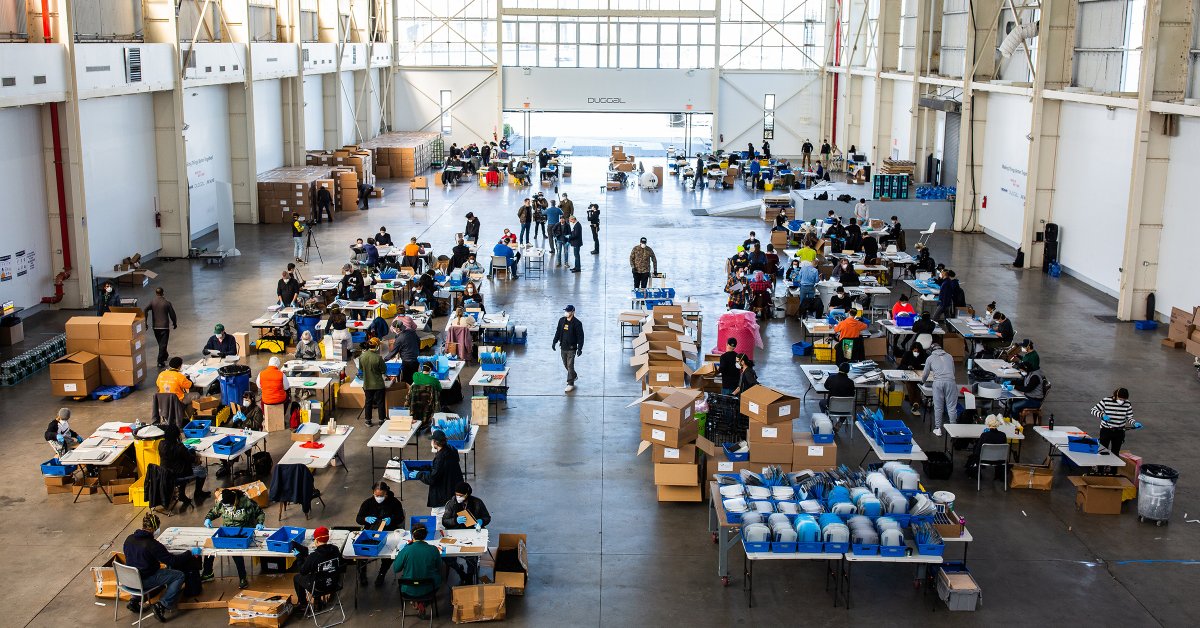
Translating…
Many American citizens, and individuals across the area, are mystified at theapparent shortagesof N95 masks, holding gear, ventilators and different crucial offers main to acknowledge to theCOVID-19 pandemic. As a minimal, aren’t markets alleged to acknowledge rapid and effectively to modifications in check of? Those on the Lawful trust a ambitious perception in markets—and but markets seem like failing us, honest when we need them most. Recent York, the epicenter of the coronavirus attack in the U.S., is clamoring for clinical offers. Trump has talked about, don’t look to us, the federal government—and even argued that states ought to level-headed compete in getting the offers they need. His resolution, belief in markets. Nonetheless markets are disappointing. How ought to level-headed we realize what is occurring?
Markets work well, when every part is going smoothly, when things are identical old. Nonetheless markets don’t work well in crises. Certainly, financial crises are symptomatic of markets now not working well—they’re on the overallpromptedby abject mess ups in markets. The 2008 monetary crisis modified into a quintessential instance. No country in instances of mighty battle turns to markets. We don’t consume markets to allocate how our troops ought to level-headed be deployed, and we didn’t rely on markets for producing tanks, airplanes, and different crucial materiel in World Battle II. We wanted speedy dart, with complex coordination and changing calls for; markets honest don’t work well in these conditions.
Moreover, markets are brief-sighted and threat averse—and the market mechanisms for trying into the future and managing risks are very unlucky. And thatnon-publicthreat aversion and that incorrect brief sightedness offers upward thrust a shapely discrepancy between social and non-public returns. Society would be pleased to trust an additional provide of masks or ventilatorshonest in case—in case we now trust an emergency be pleased the hot one. A well-functioning government would trust stockpiled them, recognizing the threat ofnow nothaving them in only the kind of circumstance as the one now confronting us. The cost of storage is infinitesimal compared to the charges of now not having these offers readily on hand, and a well-functioning government would trust known this and planned accordingly.
On the different hand, a non-public firm producing these honest in case they might be able to furthermore be wanted could well scuttle bankrupt. It would must pay out manufacturing chargesnow,and hope that it can perchance fetch a return in some unspecified time in the future. There’s no insurance it ought to clutch in opposition to the threat that they wouldn’t be wanted. Its price of capital is mighty elevated than the cost to the government and its means to undergo threat is mighty lower, so at most this could furthermore preserve a runt stock—some distance lower than is socially dapper.
Nonetheless issues are worse: now not simplest doesn’t it pay a non-public firm to stock these crucial products, it doesn’t pay it to compose in the ability to compose. In some cases, be pleased making masks, manufacturing traces ancient for one procedure can without complications be repurposed. Nonetheless now not so for others be pleased ventilators.
We trust a broader anguish in our society: we stay at the brink, on the margin, in our never-ending quest for greater effectivity. Nonetheless in doing this, we’re brief-sighted. And here is extremely so for our monetary markets, which play a central procedure in allocating sources. We saw that in 2008, in the kind of excessive threat taking. Right here, we’re seeing it again. They ticket the non eternal beneficial properties, paying no attention to the prolonged-timeframe risks. Stock costs soared as companies engaged in share buybacks—with never a notion to be how that undermined resiliency; never a notion to be,what if,what if, the economy faced one other crisis. In our brief-sightedness, we took out spare tires from cars, lowering the charges of rob by a shrimp quantity, paying no attention to the charges we pay down the road when we now trust a flat tire. We’ve been working our complete society without spare tires—and happy with the seeming effectivity we’ve received. And never prouder than in the health care sector. As a minimal, here is share of how we are in a position to give immense earnings to the health insurance and pharmaceutical companies.
Even now that the check of is so determined, companies shall be gradual to step forward. They know that in the occasion that they charge mighty bigger than the in style-or-backyard costs, they’ll be accused of ticket gouging. Nonetheless they do away with (and hope) that this can even be a one-time tournament. Can they get better the shapely charges of rapid expanding ability for a bound of producing now at identical old costs? Many will clutch that the acknowledge is no.
Right here is a social price, which needs to be shared across society, and borne disproportionately by the well-off. Hopefully, ample companies will step forward to meet our pressing offers. Nonetheless if now not, we shouldn’t hesitate to make consume of the battle-time powers of the government to commandeer the desired sources. Time is of the essence. The Trump Administration squandered beneficial weeks. There could be no such thing as a time to spare.
Please send tricks, leads, and experiences from the frontlines tovirus@time.com.
The Coronavirus Transient.All the pieces it be a need to to understand concerning the area unfold of COVID-19

Thank you!
For your security, we now trust despatched a affirmation email to the contend with you entered. Click on the link to substantiate your subscription and start receiving our newsletters. Even as you fetch now not fetch the affirmation interior 10 minutes, please check your unsolicited mail folder.
Contact usateditors@time.com.

